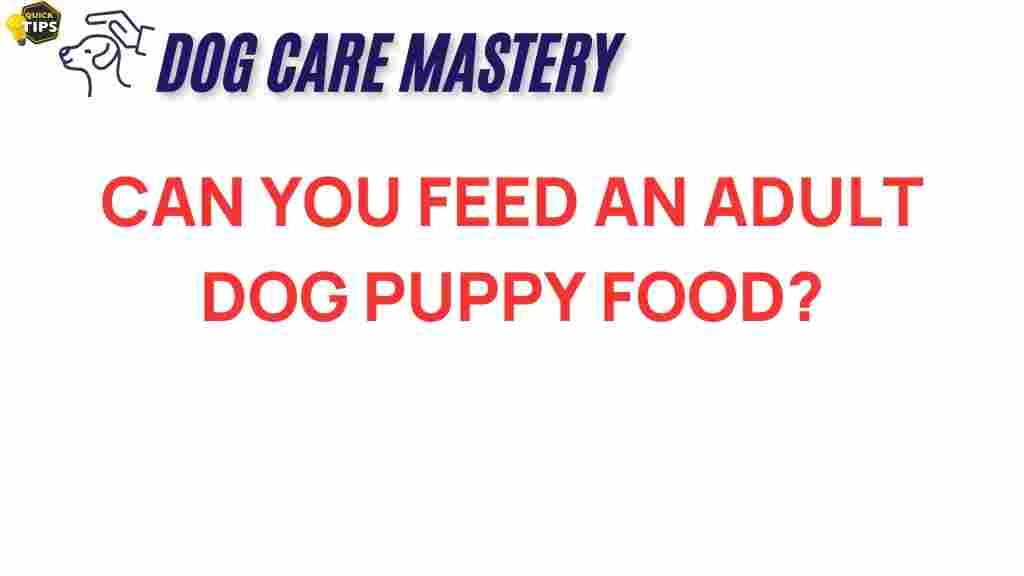The Surprising Truth: Can Adult Dogs Thrive on Puppy Food?
As a responsible pet owner, you may find yourself wondering about the dietary needs of your furry friends. One common question that arises is whether adult dogs can thrive on puppy food. The answer is not as straightforward as one might think. In this article, we’ll delve into the nutritional differences between puppy food and adult dog food, the potential benefits and drawbacks of feeding your adult dog puppy food, and what you should consider when making this decision.
Understanding the Nutritional Needs of Adult Dogs
Before we can address the question of whether adult dogs can thrive on puppy food, it’s essential to understand the unique nutritional needs of adult dogs. Adult dogs generally require a balanced diet that includes:
- Protein: Essential for muscle maintenance and overall health.
- Fats: Necessary for energy and healthy skin and coat.
- Carbohydrates: Provides energy and aids in digestion.
- Vitamins and minerals: Supports various bodily functions and immune health.
The Differences Between Puppy Food and Adult Dog Food
Puppy food is formulated specifically for growing dogs and contains higher levels of certain nutrients compared to food designed for adult dogs. Here are some key differences:
- Higher Protein Content: Puppy food generally has a higher protein content to support growth and development.
- Caloric Density: Puppy food is often more calorie-dense, which is necessary for energetic puppies.
- Fat Levels: Increased fat levels in puppy food provide the energy needed for growth.
- Vitamins and Minerals: Puppy formulas often include more vitamins and minerals to support healthy development.
Can Adult Dogs Thrive on Puppy Food? The Pros and Cons
Now that we understand the differences, let’s explore the potential benefits and drawbacks of feeding puppy food to adult dogs.
Benefits of Puppy Food for Adult Dogs
- Enhanced Palatability: Puppy food is often more appealing to dogs due to its richer flavor and aroma.
- Increased Energy Levels: The higher caloric content can be beneficial for active adult dogs, particularly those that require more energy due to their lifestyle.
- Muscle Maintenance: The protein-rich formula can help maintain muscle mass in aging dogs.
Drawbacks of Puppy Food for Adult Dogs
- Obesity Risk: The high caloric density can lead to weight gain in adult dogs that are not as active.
- Nutritional Imbalance: Feeding puppy food long-term may result in an imbalance of nutrients, as adult dogs require fewer calories and different nutrient ratios.
- Digestive Issues: Some adult dogs may experience digestive upset when transitioning to puppy food due to the richer ingredients.
When Is It Appropriate to Feed Adult Dogs Puppy Food?
While generally not recommended for long-term feeding, there are certain situations where feeding puppy food to adult dogs can be appropriate:
- Pregnant or Nursing Dogs: Pregnant or lactating dogs often require higher caloric and nutrient intake.
- High-Activity Dogs: Dogs that are very active or working dogs may benefit from the energy boost provided by puppy food.
- Recovery from Illness: Dogs recovering from illness may need extra calories and nutrients during their recuperation.
How to Transition Your Adult Dog to Puppy Food
If you decide to feed your adult dog puppy food, it is crucial to transition them properly to avoid digestive issues. Here’s a step-by-step process:
- Consult Your Veterinarian: Always consult with your veterinarian before making significant changes to your dog’s diet.
- Gradual Introduction: Start by mixing a small amount of puppy food with your dog’s current food.
- Monitor Your Dog: Watch for any signs of digestive upset, like diarrhea or vomiting.
- Increase Puppy Food Gradually: Over 7-10 days, slowly increase the proportion of puppy food while decreasing adult dog food.
- Evaluate Your Dog’s Health: Regularly assess your dog’s weight and overall health during the transition.
Troubleshooting Common Issues
When transitioning an adult dog to puppy food, you may encounter some challenges. Here are some common issues and tips for addressing them:
- Digestive Upset: If your dog experiences diarrhea, go back to the previous food and reintroduce puppy food more slowly.
- Weight Gain: Monitor your dog’s weight closely. If they are gaining too much, consider switching back to adult food or adjusting portions.
- Preference Issues: If your dog refuses to eat the new food, try warming it up or mixing in a little wet food to entice them.
Conclusion: Making the Right Choice for Your Adult Dog
In conclusion, while adult dogs can thrive on puppy food in certain circumstances, it is generally not advisable for long-term feeding due to the nutritional differences and potential risks involved. Always consult your veterinarian before making any significant changes to your dog’s diet. Remember, the best choice for your furry friend is a balanced diet specifically formulated for their life stage.
For more information on dog nutrition and health, check out this informative resource. If you’re curious about the best food options for your adult dogs, you can read more on our website.
This article is in the category Nutrition and created by dogcaremastery Team

1 thought on “The Surprising Truth: Can Adult Dogs Thrive on Puppy Food?”